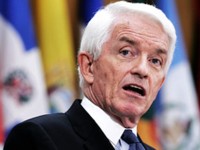Climate Change Flapdoodle
 Washington - Thomas Donohue, President and CEO of the U.S. Chamber of Commerce, faced with a handful of company defections over the group’s position on climate-change policy, has blasted the latest defector - Apple Inc. for “misstating” its stance on the issue and suggested that the departures were part of an orchestrated campaign to embarrass the chamber.
Washington - Thomas Donohue, President and CEO of the U.S. Chamber of Commerce, faced with a handful of company defections over the group’s position on climate-change policy, has blasted the latest defector - Apple Inc. for “misstating” its stance on the issue and suggested that the departures were part of an orchestrated campaign to embarrass the chamber. Mr. Donohue spoke at a news conference organized by the chamber on Thursday, in the wake of defections of such high-profile members as PG&E, PMN, Exelon, and now Apple, with Nike threatening the same.
Mr. Donohue said his group was “for federal legislation to control and reduce greenhouse-gas emissions,” but that it believed a proposal approved by the House of Representatives in June to cut U.S. emissions 17% beneath 2005 levels by 2020 was flawed. That measure would “significantly raise energy prices, throw more American out of work” and potentially put U.S. companies at a disadvantage to competitors in countries that do not limit emissions, such as China, he said.
Mr. Donohue said his group, which claims 300,000 members, supported efforts to fight climate change through federal investments and incentives to develop alternative forms of energy that can be produced without emitting carbon dioxide. He said President Barack Obama and many lawmakers have expressed preference for tackling climate change through new legislation, rather than through the Clean Air Act, which gives the Environmental Protection Agency limited leeway to consider cost in setting regulations.
Over the summer, the chamber petitioned the EPA to hold a hearing on the evidence that the agency had considered when it concluded earlier in the year that greenhouse gases endanger public health and welfare – the legal standard for regulating them under the Clean Air Act.
With such defections, it would seem the Chamber is between a rock and a hard place.
But as Andy Hultgren, Project Manager for the SWCA Environmental Performance Group notes in an article in Environmental Leader, the simple question is this: Is the US Chamber of Commerce really between a rock and a hard place, or are they simply looking in the rear-view mirror instead of focusing on the road ahead?
According to a number of studies, the climate change legislation the U.S. Chamber of Commerce so vigorously opposes would save the American people and American businesses over $200 billion in economic costs in 2020 and nearly $300 billion in economic costs in 2050.
Studies by the EPA, noted Hultgren, have shown that with respect to Electricity Prices:
- In its core scenario, no electricity price increase in 2015 and 2020, vs. the reference case (business-as-usual) scenario. Two decades from now, by 2030, EPA found electricity prices increase by only 13 percent vs. the reference case.
- Household Consumption: Average household consumption is very minimally impacted: reduced by 0.03-0.08 percent in 2015, 0.10-0.11 percent in 2020, and 0.30-0.31 percent in 2030.
- Household Consumption Growth: 5 and 10 year average annual household consumption growth is reduced only 0.1 percent for 2015 and 2020.
- Total climate change legislation cost: $30 billion in 2020 and $213 billion in 2050.
Other studies have shown, according to Hultgren, that if climate change is left unchecked and we pursue a business-as-usual scenario, America will face:
- Increased hurricane damage: Economic losses caused by the increasing intensity of Atlantic and Gulf Coast storms.
- Real estate losses: Rising sea levels result in damaged or destroyed real estate.
- Energy costs: Rising temperatures will have a net effect of increasing energy demand for air conditioning and refrigeration, even after accounting for the reduction in winter heating demand in northern latitudes.
- Water costs: Increased costs to provide water to the driest and most water-stressed parts of the US as climate change exacerbates drought conditions and disrupts existing patterns of water supply.
- Total cost of the business-as-usual scenario: $271 billion in 2025 and $506 billion in 2050.
The Chamber has said it favors “mainstream, common sense views” on climate change but opposes the climate bill now before the Senate and passed narrowly by the House of Representatives in June.
The simple truth is, this is much more than a “Flapdoodle” - it is a clear sign that the mood of corporate America with respect to climate change has changed dramatically in the last few years and that the U.S. Chamber of Commerce had better get with the times, or risk being left in the dust of time.
For More Information: US Chamber of CommerceYou can return to the main Market News page, or press the Back button on your browser.

